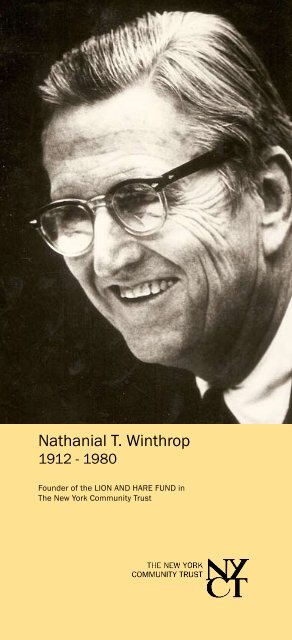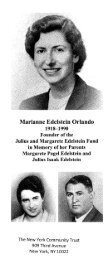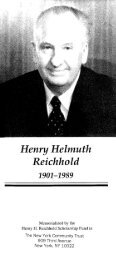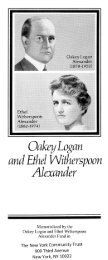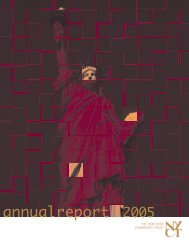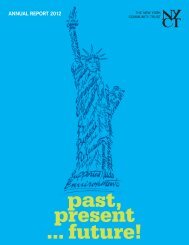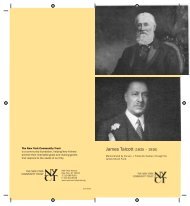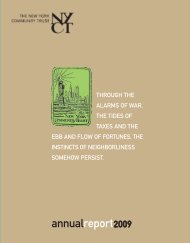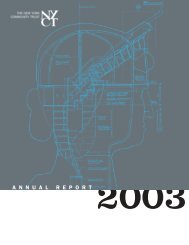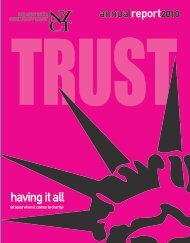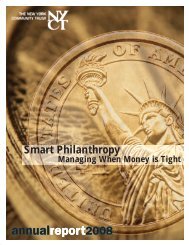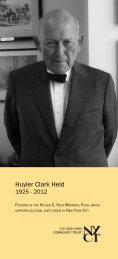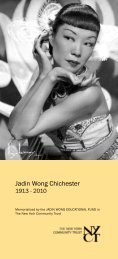Nathanial T. Winthrop - The New York Community Trust
Nathanial T. Winthrop - The New York Community Trust
Nathanial T. Winthrop - The New York Community Trust
Create successful ePaper yourself
Turn your PDF publications into a flip-book with our unique Google optimized e-Paper software.
<strong>Nathanial</strong> T. <strong>Winthrop</strong><br />
1912 - 1980<br />
Founder of the Lion and Hare Fund in<br />
<strong>The</strong> <strong>New</strong> <strong>York</strong> <strong>Community</strong> <strong>Trust</strong>
Nathaniel Thayer <strong>Winthrop</strong> was not a<br />
man easily categorized. A liberal and<br />
original thinker born to one of America’s<br />
distinguished (and conservative)<br />
founding families, he was “a man of many<br />
contradictions,” according to his son, John. He was<br />
old-fashioned and also ahead of his time. He was a<br />
homebody and also a great traveler. He relished the<br />
excitement of <strong>New</strong> <strong>York</strong> City, where he lived most of<br />
his adult life, but he loved being close to the land,<br />
especially on the large plantation his family owned<br />
in South Carolina. He was also a man of “boundless<br />
generosity,” though during his lifetime, he insisted<br />
that much of his charity be given anonymously.<br />
Unsurprisingly, John describes his father as a man<br />
of “profound modesty and selflessness” to whom<br />
praise and applause had no meaning.<br />
Mr. <strong>Winthrop</strong> was born May 20, 1912,<br />
in Hamilton, Massachusetts, to Frederic and<br />
Sarah Thayer <strong>Winthrop</strong>. He was a member of the<br />
tenth generation of <strong>Winthrop</strong>s in America, and a<br />
direct descendant of colonial-era Massachusetts<br />
Governor John <strong>Winthrop</strong>. Mr. <strong>Winthrop</strong> was<br />
educated at St. Mark’s School in Southborough,<br />
Massachusetts, and at Harvard University, from<br />
which he graduated in 1934. After attending law<br />
school at the University of Virginia, he went back<br />
to Boston and nine years later moved to <strong>New</strong> <strong>York</strong><br />
City, where he hoped “some of the excitement of<br />
business enterprise and enthusiasm for public<br />
improvement” might brush off on him, according<br />
to an account of his life published in the journal of<br />
1
<strong>Nathanial</strong> as a young man.<br />
the Massachusetts Historical Society.<br />
Indeed it must have, for he embarked promptly<br />
upon a long and successful career in trust and<br />
estate law—initially with the firm Mitchell, Capron,<br />
Marsh, Angulo & Cooney and then with Sherman<br />
& Sterling—and became deeply involved with<br />
a wide range of civic causes and community<br />
organizations.<br />
With his six-plus-foot frame, pale blue eyes,<br />
and wide smile, Mr. <strong>Winthrop</strong> was a family man. In<br />
1935, he married Serita Bartlett, with whom he had<br />
four children: John, Matthew Bartlett, Beekman,<br />
and Serita. Four more children—Nathaniel Thayer,<br />
Jr., Katharine, Cornelia Thayer, and Stephen Van<br />
Rensselaer—arrived following his marriage to<br />
Eleanor R. Beane in 1950. Mr. <strong>Winthrop</strong> took true<br />
pleasure in fatherhood. In son John’s words, he<br />
had “an enormous sense of joy” about his family.<br />
2
In annual Christmas letters to family and friends,<br />
he shared the accomplishments and activities<br />
of his brood. And throughout his life, John notes,<br />
wherever and whenever the family gathered, it was<br />
clear that he “drew strength” from the warmth of<br />
the occasion.<br />
Mr. <strong>Winthrop</strong> was an attentive and<br />
compassionate adviser to his children, generous<br />
not only in material terms, but in emotional and<br />
spiritual ones as well. As John attests, “When we<br />
pondered the heavy questions, he didn’t expect<br />
us to come up with the same answers; he even<br />
encouraged diversity of thought among us.” He<br />
always did things his own way, John says, and<br />
was always determined that others, his children<br />
included, should do the same.<br />
All his life, Mr. <strong>Winthrop</strong> was a passionate and<br />
intrepid traveler. His wanderlust dated, perhaps, to<br />
his World War II naval service, when he served on a<br />
number of destroyer vessels during four invasions.<br />
Whatever their impetus, however, the <strong>Winthrop</strong>s<br />
traveled “widely, intelligently, and well.” <strong>The</strong>ir stays<br />
in locales as exotic and diverse as China, India, and<br />
South America inspired and were inspired by their<br />
mutual interest in foreign peoples and cultures.<br />
During several months in Beirut in 1954 and 1955,<br />
Nathaniel and Eleanor studied the people and<br />
history of the Middle East. After returning home<br />
from a two-month stay in sub-Saharan Africa in<br />
1966, they undertook to raise funds to support<br />
the founding of interracial schools in Swaziland<br />
and Botswana.<br />
Though Mr. <strong>Winthrop</strong> wasn’t himself a regular<br />
churchgoer, he pursued religious studies as a key<br />
3
<strong>Nathanial</strong> <strong>Winthrop</strong> with his second wife, Eleanor,<br />
and his eight children.<br />
to understanding local history and customs. He<br />
eventually became involved with the Laymen’s<br />
Movement for a Christian World and the Council<br />
of Religion in International Affairs, and joined<br />
the American Institute of Buddhist Studies and<br />
the Center for Study of World Religions, which is<br />
affiliated with the Harvard Divinity School.<br />
Mr. <strong>Winthrop</strong> was deeply involved with many<br />
other institutions as well. He served as a director<br />
of the Solebury School in <strong>New</strong> Hope, Pennsylvania,<br />
and of the Child Study Association of America,<br />
and was a member of the Visiting Committees<br />
of Harvard’s Fogg Art Museum and the Harvard<br />
Divinity School. For 10 years he was a trustee of<br />
the Experiment in International Living, a program<br />
4
<strong>Winthrop</strong> with his daughter Katie in 1960.<br />
started during the Great Depression to promote<br />
student exchanges as a means of improving<br />
relations and understanding among nations. He<br />
served on the Experiment’s executive committee<br />
for three years, and on its National Advisory<br />
Council from 1972 until his death in 1980.<br />
During that time he was instrumental in helping<br />
to develop its first program in China, and also in<br />
promoting its ultimately successful merger with<br />
the American Field Service. He also supported<br />
many other organizations financially, though often<br />
anonymously. And despite his many engagements,<br />
Mr. <strong>Winthrop</strong> never simply wrote a check, but<br />
actively monitored the use and effectiveness of<br />
his gifts.<br />
5
In 1970, Nathaniel Thayer <strong>Winthrop</strong> set up<br />
the Lion & Hare Fund in <strong>The</strong> <strong>New</strong> <strong>York</strong> <strong>Community</strong><br />
<strong>Trust</strong> to support his philanthropic interests. Today,<br />
his eight children advise the fund. For a man not<br />
readily pigeonholed in his own life, this seems<br />
an apt tribute. As one of his sons said during a<br />
memorial service for him, “He was a good man, a<br />
kind man, a generous man, a man of integrity, a<br />
man of ideas. He had a great love of life in all its<br />
splendid diversity. He enjoyed people, and people<br />
enjoyed him. He loved to travel, and he welcomed<br />
guests into his home from all walks of life and from<br />
all over the world.”<br />
6
<strong>The</strong> <strong>New</strong> <strong>York</strong> <strong>Community</strong> <strong>Trust</strong><br />
is a community foundation, helping <strong>New</strong><br />
<strong>York</strong>ers achieve their charitable goals<br />
and making grants that respond<br />
to the needs of our City.<br />
909 Third Avenue<br />
<strong>New</strong> <strong>York</strong>, NY 10022<br />
T: 212-686-0010<br />
F: 212-532-8528<br />
www.nycommunitytrust.org<br />
March 2010


